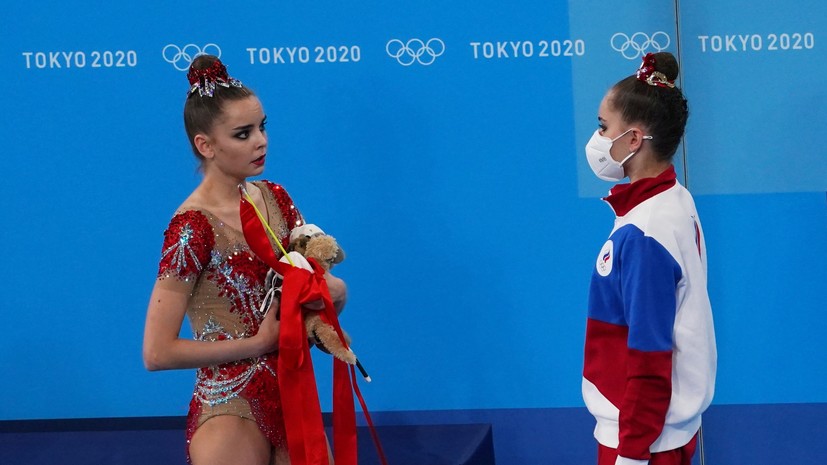Outrageous injustice.
This is how most of the eyewitnesses reacted to the defeat in the all-around final of 13-time world champion Dina Averina.
Dina really deserved an Olympic victory like no other.
Like her sister Arina.
After these two athletes shared the gold and silver of the European Championship, the famous Russian coach Amina Zaripova noticed that she did not see at all how it was possible to get ahead of the Russians in the all-around if they did not make mistakes.
What happened in Tokyo?
The advantage of the Israeli woman began to take shape from the very first type of all-around, and not to say that in crumbs.
In the exercise with the hoop Ashram won 0.35 points against Dina Averina, the ball went head to head, but the clubs brought Lina another 0.5 points of advantage, which was probably expected: in this form, the Israeli gymnast in 2021 became the European champion, and won the European Games in 2019.
From the Russian side, protests immediately rained down about the assessments of the Averin sisters, but if the first were not satisfied, then Dine revised them after the clubs, raising the amount by 0.4 points.
It is curious, but not only the Russians, but also others, have become bolder, realizing that where it is thin, there it is torn.
True, at that moment the Averins did not care about the problems of the others.
They refused to understand what was happening by looking at the scoreboard and were clearly nervous as never before.
Sooner or later, emotions had to make themselves felt.
Arina was the first to make a mistake - from the excessive heat and humidity in the hall, a ribbon was tied to her, which in fact gave people in masks at the tables an indulgence to deprive her of a medal.
Subjective sports are dangerous precisely because of their subjectivity. This component is always tacitly laid down in the rules of refereeing: you can act absolutely within the framework of the rules, slightly squeezing one athlete and letting go of the other, and in the aggregate this will give a significant difference in the marks. It is no coincidence that in one of her interviews, the outstanding synchronized swimming coach Tatyana Danchenko stressed: “To win, you need to be not one head taller than your rivals, but three. One head is "cut off" at a time! ".
Now you can find a thousand arguments in favor of the fact that Dina Averina and only she should have won. Ashram, finishing her performances with the tape, made a gross mistake, not catching the object. Penalties are clearly spelled out in the rules on this score: one point. After three types of all-around, the Israeli woman had a colossal supply, but all of it had to be eaten by a fine. In addition, Dina performed her final exercise absolutely flawlessly, and there was no doubt that she was much more deserving of victory.
However, the opposite arguments were also abundant. Ashram, which, unlike Dina and Arina, had absolutely nothing to lose (bronze in the Olympic finals, I think, would have arranged for her), looked freer, more relaxed and more relaxed in the first three performances than those who had the unbearable burden of responsibility for their future result. Such things always win over the judges. It is possible that by the time of the Ashram's final appearance on the carpet, all of them had already become so accustomed to the idea that they were facing the absolute champion of the Games, that they judged her as a champion, and not as an athlete, for whom bronze is for happiness.
In addition, the Israeli woman did not lose the apparatus "at risk", as they say in rhythmic gymnastics, implying that the loss did not greatly affect the overall complexity of the combination. As for the merits, titles, the authority of the national federation and the personality of the head coach, that is, those components that so often lie in subjective sports as an add-on to the result, none of this list has played in Tokyo. This happens quite often at the Olympic Games. In this regard, my colleague, a wonderful journalist Olga Linde, once put it very accurately, writing that the Games are perhaps the most dastardly competition on earth, because they are able to ascend someone unknown to Olympus and kill the truly great.
Sometimes it is difficult to disagree with this.
Perhaps, in the life of Lina Ashram, such a performance will never happen again, but it does not matter at all: she used her absolutely incredible Olympic chance not even for one hundred, but for all two hundred percent.
But how painful and offensive it is to admit it now!

